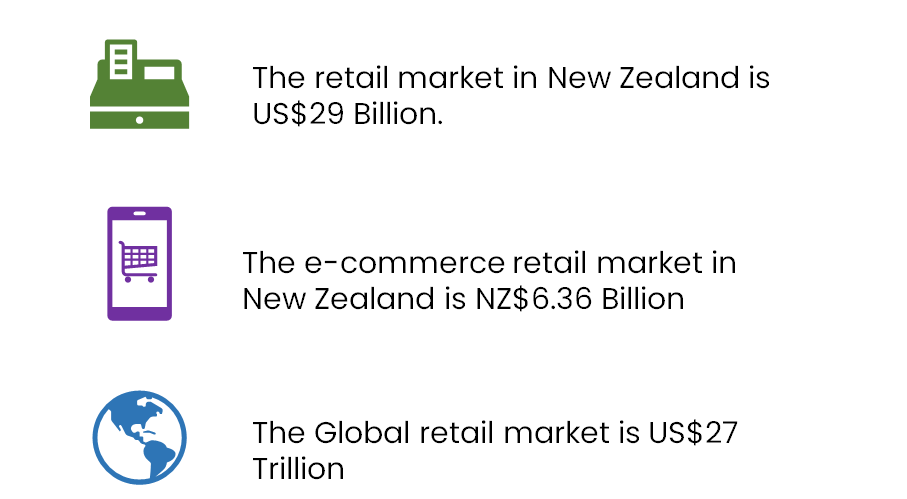fair&good’s goal is to make ethical shopping mainstream. Why? Because we see ethical consumption as having huge potential to have a huge impact on many lives – if it is mainstreamed. In the past ethical shopping has often been regarded as niche. But that is changing, and we want it to change.
fair&good was born out of a conviction that spending our money ethically is one of the most powerful tools we all have to bring about change. We want to leverage off and magnify that for maximum impact so we can create a world where everyone is free from poverty and exploitation, able to thrive, flourish and prosper, not just a few.
The big brands (by definition) sell more, and if they sell more then they can have greater real-world impact and improve more lives. Larger companies employ more people or buy crops from more farmers, so they can have the biggest impact. But can big companies be ethical? Keep reading.
Mainstreaming ethical consumption, then, means normalising ethical shopping by Kiwi consumers and both large and smaller companies having transparent and ethical supply chains. It means mainstreaming the stocking of ethical products in our shops and ethical sourcing by retailers.
Why is mainstreaming ethical consumption is so important?
Let’s go back. When our co-founder, Dr Susan Maiava, was reflecting on her 40 years of experience in development fieldwork, academia and governance, she concluded that development faces a glass ceiling caused by unresolved income inequality.
After visiting a garment factory in Chittagong, Bangladesh in 2016 where women were working shoulder-to-shoulder embroidering logos on shirt pockets for a large mainstream European-based brand for less than $3USD a day, she realised this was what consumers were (inadvertently) demanding.
Development cannot be fully achieved while income disparity remains. And that disparity originates in what we pay for the products we consume. Western consumers are complicit in this injustice, but they also have the power to change and create change. The key to breaking through that glass ceiling lies in the purchasing power of Western consumers.
I realised that if consumers could have a negative influence through their consumption, then the opposite must also be true; that consumers empowered to make ethical shopping decisions could reduce poverty, inequality and exploitation. That realisation inspired me to start fair&good.
The potential impact is huge

Data from Stats NZ & a report from NZ Post (2)
Influencing just a small percentage of people to make the shift to ethical consumption could significantly increase the income received by workers, makers, farmers and creators in developing countries.
If only 5% of the 25% of consumers who say they would pay more for ethical products (3) did so, it could see $1.45 Billion spent ethically from New Zealand alone. fair&good believes we could shift that nearer to 25% (of 25% of consumers) (6.25% of all consumers).
That could deliver $7.25 billion per year spent ethically! Money that would increase incomes, close the inequality gap, open opportunities, and change lives.
Of course this is retail spend. But compare it with New Zealand’s annual Aid Budget of $2.2 billion (4) to see how effective it could be. (5)(6)
Ethical consumption is an unrecognised but powerful complementary alternative path to achieving development goals.
In Bangladesh, Susan asked microfinance group members what difference increased income would make in their lives. Invariably she was told one of two things: Parents would be able to pay for school uniforms so they could send their children to school, or they would now be able to eat three meals a day instead of two.
How much more if we could re-shape the narrative; communicating a powerful new way for consumers to end exploitation, achieve development and support families and communities? If we could achieve a paradigm shift in ethical consumption and business: changed consumer expectations and behaviour, and mainstream businesses committed to implementing ethical business practices throughout their supply chains.
Yes, it is a lofty goal, which is why we see ourselves as facilitators, working in partnership with and encouraging other not-for-profits, brands and, dare I say it, big brands and corporates who are on this journey.
Every shopper can be an agent of change. Every purchase counts. Every dollar can be spent with purpose. But to really have impact and change behaviour needs volume and quantity. We are continuously expanding the range of products highlighted on fair&good, so shoppers can find ethical products in a wider range of product categories, normalising ethical shopping even more. And we are taking our message wider, encouraging not only conscious consumers but anyone and everyone who cares about justice and fairness.
What about Niche?
But expanding the product range and taking the message to a wider audience has its challenges and not everyone is accepting. We’ve received some criticism for taking this message wider and including some brands that are not perfect.
- For some only perfection is good enough. We disagree. Progress in the right direction is to be encouraged.
- Some want to keep ethical niche and somehow ‘better’ than mainstream. We disagree. It’s not about virtue signalling but everyone doing the right thing.
- Some believe big companies can never be ethical; that the profit motive precludes it. We disagree. If consumers demand it, businesses will respond.
We are looking for and encouraging brands who are on the journey, brands whose heart is genuinely and authentically in the right place and who are taking action, not already perfect. That is why one of our core values is consistency and improvement. We showcase brands who are working to apply ethical values through their whole business; who are not ‘washing’ but genuine.
Niche is great, and we love supporting and telling the stories of our smaller partner brands. But niche alone is not enough to create the paradigm shift we are working to create.
Even so, small is great for another reason: because they grow, and we love to support them as they grow. A few examples of passionate small brands becoming passionate big brands are Bennetto and Karma Drinks (who grew from Karma Cola), and Orba shoes. Trade Aid chocolate bars are now offered as snacks on Air New Zealand flights which is a great step in normalising ethical consumption.
These brands, in turn, can help and inspire others to grow too, as they have done in our “Ethics in Action” webinar series.
Can big business be ethical?
Yes, they can. An important part of mainstreaming is recognising that big brands can be ethical. Because the big brands (by definition) sell more, and if they sell more then they can have greater real-world impact and improve more lives.
And while it is often harder to change the course of a large organisation with a mass demand to fulfil, incremental changes by companies at scale can have larger impact.
When assessing larger companies, fair&good looks for best practice ‘Code of Conduct’ agreements with their suppliers, robust supply chain auditing processes and easily accessible corporate social responsibility and sustainability reports. But that’s not all, it’s not just a matter of ticking boxes. We make sure we are sure!
And the bigger brands we endorse are loving it, pleased to recognised for the work they are doing in their supply chains to avoid modern slavery, child labour, exploitation and to ensure the workers who make their products are paid fairly, work in safe working conditions, for reasonable hours and their rights are upheld.
Examples include Kathmandu, Dilmah, Sealord, Air New Zealand and even, dare we say it, The Warehouse. And these big businesses can influence other big businesses and lead the way, showing others how it is done. Change is certainly possible.
As for other big brands, it’s up to us, the consumer, to demand it of them. Because that is where change will have the most impact.
References
- She went on to develop fair&good’s ultimate goal and strategy: to mainstream ethical shopping by harnessing our combined purchasing power to reach a tipping point in consumer demand where suppliers and retailers respond by sourcing and selling ethical products as their normal practice.
- Data by Stats NZ and a report by NZ Post
- What consumers need in order to adopt a more sustainable lifestyle
- MFAT – Where our funding goes
- Aid is good. We see ethical consumption as complementary to aid.
- In both cases costs are removed before funds or outputs reach workers, families and communities so the figures are roughly comparable.

